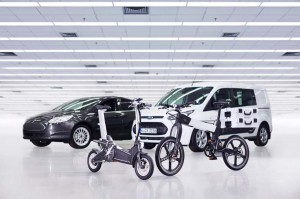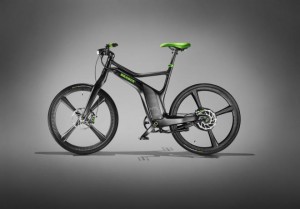It’s not the sort of name that easily rolls off the tongue, but it’s how the MoDe: Pro rolls down the pavement that matters.
Call it an e-bike, if you prefer, or you can opt for Ford Motor Co.’s “commercial multi-modal transport system.” The two-wheeler made its debut at this month’s Mobile World Congress and is designed to not only take over when you’re tired of pedaling, but to integrate with your smartphone and wearable technologies.
Ford, however, is just the latest on a fast-growing list of automakers who have shown off trick electric bicycles in recent years. It follows such auto industry competitors as Toyota, Porsche, Audi, BMW and Mercedes-Benz. But whether MoDe: Pro actually makes it into production is another matter entirely.
“Changing the way we think, collaborate and behave is essential to ensuring freedom of movement of both people and economies,” explained Barb Samardzich, chief operating officer, Ford of Europe. “The Ford Smart Mobility plan supports our commitment to innovation and is aimed specifically at developing smarter transportation systems that take the worry and anxiety out of journey planning and improve the quality of life in busy cities.”
Automakers are facing some major challenges when it comes to urban transportation. The global population is steadily shifting into mega-cities where there’s been a growing demand for personal transportation. But whether in Berlin or Beijing, city streets have become crowded to the point of gridlock, leading urban planners to contemplate strict new limits on the automobile.
(Click Here for details about automakers struggling with privacy issues in high-tech cars.)
London already has a hefty congestion tax designed to limit inner-city traffic. Beijing and a dozen other Chinese cities have enacted registration lotteries to slow down the growth of traffic. Hamburg is considering banning the automobile entirely, while other cities may limit in-town access to zero-emissions vehicles.
Ford showed off two versions of the MoDE at the Barcelona conference:
- The MoDe: Me, produced in partnership with bicycle maker Dahon is “intended for urban commuters to keep moving in congested city traffic. Commuters could park on the outskirts of town, unfold the e-bike and ride the rest of the way to work.
- The MoDe: Pro was developed in-house and also can fold up and tuck inside a commercial vehicle like the Ford Transit Connect. It “is intended for urban commercial use such as by couriers, electricians, and goods and delivery services,” the maker explains.
The Pro’s 9 amp-hour lithium battery powers a 200-watt motor that lets it hit speeds up to 15 mph for up to 1.5 hours of riding. It allows you to pedal to extend your trip, but the bike can be paired with a heartrate sensor to automatically turn on its motor when your pulse reaches a certain level. It can pair with your smartphone for directions, tracking and delivery scheduling, as well. Instead of requiring you to look at a screen, the Pro’s handlebars vibrate to signal when to make a turn.
(To see the 10 best debuts at the 2015 Geneva Motor Show, Click Here.)
Will Ford build either e-bike? For now, the company says it is looking for feedback. It showed off an earlier electric bike at the 2011 Frankfurt Motor Show that never made it into production.
Only a handful of automakers have actually pedaled the extra mile to get their e-bikes into consumer hands so far. That includes Mercedes-Benz which wound up selling only a handful back around 2003. Potential buyers were turned off by its weight and sluggish performance according to website electricbike.com.
Smart put a small number of its own electric bikes into consumer hands, produced at a plant in China. And BMW rolled out a small number of its own e-bikes to use at the 2012 London Olympics for which it served as a major sponsor.
It seems like every major automaker has sensed the need to offer up auto alternatives – at least in concept. But so far, they’ve not found a way to make a compelling case to actually get into the e-bike business.
If an when they do, they’ll be facing plenty of competition, much of it from China which is now producing more than 20 million of them annually – most for domestic use. German trade papers suggest production there is approaching 500,000 annually. And in Japan, sales of e-bikes now exceed demand for mopeds.
(The 10 weirdest automotive accessories ever. Click Here for more.)



If it’s light enough, I could see it, especially now that biking is a more popular mode of transport.
Rent them out on Mackinac Island. I’d love to have a bike that would power me up that hill by the Grand Hotel!
Auto makers will likely lobby to get CAFE credits for these toys.